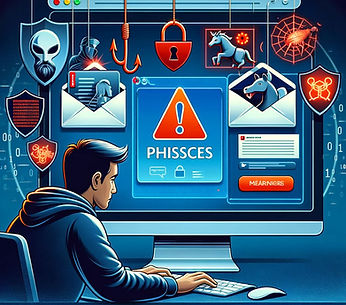Mental Resilience
Cyber scams can be incredibly distressing. They often leave victims feeling violated, mistrustful, and anxious about their future online interactions. These experiences are understandably hard to process and can impact a person’s sense of security in both the digital and real worlds. In the wake of a cyber scam, developing mental resilience is essential to reclaiming confidence and rebuilding trust in yourself and the online spaces you navigate.

Understanding the Emotional Impact of Cyber Scams
Cyber scams, whether they involve financial loss, stolen personal information, or even emotional deception, strike at our basic need for safety and security. Many people experience:
Feelings of Violation: Knowing that a stranger accessed your personal information or even took advantage of your trust can make you feel vulnerable and exposed.
Mistrust: It’s natural to question your own judgment after a scam. You may wonder, “How could this happen to me?” or “Who can I trust online?”
Anxiety and Stress: The worry that it could happen again, or that your information could be further misused, can cause ongoing stress and unease.
Acknowledging these feelings as valid and common is the first step toward recovery. You’re not alone in feeling this way, and these emotions don’t have to define your relationship with technology or online interactions moving forward.
Steps to Mental Resilience After Cyber Scams
Building mental resilience isn’t about ignoring or minimizing what happened. Instead, it’s about learning from the experience, regaining your confidence, and moving forward with a renewed sense of security. Here are some gradual steps to support your mental recovery:
1. Practice Self-Compassion
Being kind to yourself is crucial. Falling victim to a scam is not a reflection of your intelligence or judgment. Cyber scammers are increasingly sophisticated, using psychological tactics that can deceive even the most cautious individuals. Remind yourself that you’re not alone, and approach your recovery with patience and understanding.
2. Give Yourself Time to Process
There’s no rush to move past the experience. Allow yourself the space to feel and process your emotions. Journaling can be particularly helpful here. Write about your feelings, your worries, and even the lessons you’ve learned. These reflections can serve as valuable reminders of your strength and adaptability as you move forward.
3. Set Small Goals for Online Interactions
It’s natural to feel hesitant about engaging online after a scam experience. Start small: set manageable goals like reviewing your social media settings, changing passwords, or learning about online security tools. Each small step you take will build your confidence and reassure you that you can protect yourself.
4. Embrace Mindfulness and Stress-Relieving Techniques
Practicing mindfulness can reduce anxiety and help you regain focus and calm. Simple techniques like deep breathing exercises, meditation, or even mindful walking can ground you in the present moment and lessen the residual stress from the scam experience. Consider using apps or guided meditation videos if you’re new to mindfulness.
5. Seek Support from Trusted People
Talk to friends, family, or even support groups who can listen and provide reassurance. Sharing your experience can lift some of the burden and allow others to offer advice or simply a comforting ear. Reaching out can also remind you that you have a support network ready to stand by you.
6. Reframe the Experience as a Learning Opportunity
While it may be difficult, consider this experience as a stepping stone for growth. Reflect on what you’ve learned about online safety and take proactive steps to strengthen your digital practices. Building resilience often comes from viewing challenges as opportunities for greater awareness and empowerment.
Moving Forward with Greater Confidence
Resilience isn’t about erasing the impact of what happened; it’s about moving forward with new knowledge and strength. With time and gradual steps, you can regain trust in yourself and feel secure online again. Embracing this journey of mental resilience will empower you to approach digital interactions with renewed caution, confidence, and a deeper understanding of online safety.
Remember, you’re not defined by this experience. You have the strength to rebuild, and each small step will help you recover not only your digital security but also your sense of trust and empowerment in the online world.


